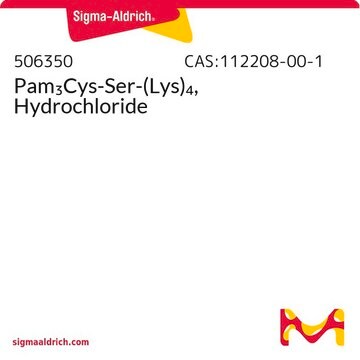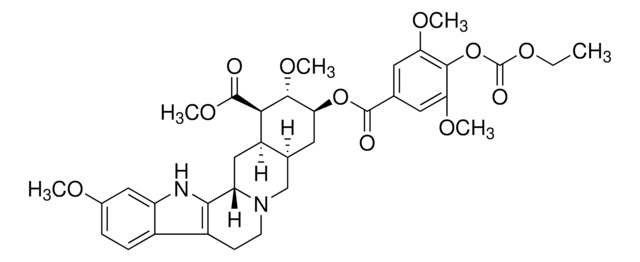R0875
Reserpine
Synonym(s):
(3β, 16β, 17α, 18β, 20α)-11,17-Dimethoxy-18-[(3,4,5-trimethoxybenzoyl)oxy]yohimban-16-carboxylic acid methyl ester
About This Item
Recommended Products
Quality Level
mp
~265 °C (dec.)
SMILES string
CO[C@H]1[C@@H](C[C@@H]2CN3CCc4c([nH]c5cc(OC)ccc45)[C@H]3C[C@@H]2[C@@H]1C(=O)OC)OC(=O)c6cc(OC)c(OC)c(OC)c6
InChI
1S/C33H40N2O9/c1-38-19-7-8-20-21-9-10-35-16-18-13-27(44-32(36)17-11-25(39-2)30(41-4)26(12-17)40-3)31(42-5)28(33(37)43-6)22(18)15-24(35)29(21)34-23(20)14-19/h7-8,11-12,14,18,22,24,27-28,31,34H,9-10,13,15-16H2,1-6H3/t18-,22+,24-,27-,28+,31+/m1/s1
InChI key
QEVHRUUCFGRFIF-MDEJGZGSSA-N
Gene Information
human ... HTR1A(3350) , HTR1B(3351) , HTR1D(3352) , HTR1E(3354) , HTR1F(3355) , HTR2A(3356) , HTR2B(3357) , HTR2C(3358) , HTR3A(3359) , HTR3B(9177) , HTR3C(170572) , HTR3D(200909) , HTR3E(285242) , HTR4(3360) , HTR5A(3361) , HTR5B(645694) , HTR6(3362) , HTR7(3363) , SLC18A2(6571)
Looking for similar products? Visit Product Comparison Guide
Application
- to study its effect on minimal inhibitory concentration of trovafloxacin and ciprofloxacin
- inject rats, to study its effect on behavioural parameters such as locomotion and fear/anxiety
- as a lock spray reference compound in lipid profiling
Biochem/physiol Actions
Features and Benefits
Signal Word
Danger
Hazard Statements
Precautionary Statements
Hazard Classifications
Acute Tox. 4 Oral - Carc. 2 - Repr. 1A - STOT SE 3
Target Organs
Central nervous system
Storage Class Code
6.1C - Combustible acute toxic Cat.3 / toxic compounds or compounds which causing chronic effects
WGK
WGK 3
Flash Point(F)
Not applicable
Flash Point(C)
Not applicable
Personal Protective Equipment
Certificates of Analysis (COA)
Search for Certificates of Analysis (COA) by entering the products Lot/Batch Number. Lot and Batch Numbers can be found on a product’s label following the words ‘Lot’ or ‘Batch’.
Already Own This Product?
Find documentation for the products that you have recently purchased in the Document Library.
Customers Also Viewed
Articles
Discover Bioactive Small Molecules for ADME/Tox
Discover Bioactive Small Molecules for ADME/Tox
Discover Bioactive Small Molecules for ADME/Tox
Discover Bioactive Small Molecules for ADME/Tox
Our team of scientists has experience in all areas of research including Life Science, Material Science, Chemical Synthesis, Chromatography, Analytical and many others.
Contact Technical Service











